David O. Russell (Three Kings, Silver Linings Playbook) has made some star-studded movies in the past, but nothing on the level of his new period piece Amsterdam. Based on a true story, it focuses on three close friends (Christian Bale, Margot Robbie, and John David Washington) who get caught up in the murder of a U.S. senator.
The all-star lineup of the film, opening in theaters on October 7, also includes Chris Rock, Anya Taylor-Joy, Zoe Saldaña, Mike Myers, Michael Shannon, Timothy Olyphant, Andrea Riseborough, Taylor Swift, Matthias Schoenaerts, Alessandro Nivola, Rami Malek and Robert De Niro.

We had the chance to attend a press day featuring David O. Russell alongside Bale, Robbie, Washington, Shannon, Myers, Riseborough, and Malek as they discussed their characters and the years-long process of crafting them for the screen.
“Christian and I were very interested in creating original characters that we would want to hang out with,” said David O. Russell. “He would love to play, and I’d love to be around, and other characters that we’d want to be with who are original. These are characters we’ve never seen before, characters we’ve never seen him be.”

The filmmaker continued: “That’s where it began. We started with a doctor, and we started to learn from history the unusual circumstances of this doctor and his two best friends. We wanted to have three best friends who were fixers, who could handle any situation, and who went through something together. Something epic, something that would be fun to follow, and inspiring to follow, and also shine a light on some history that we had a hold of that many people don’t know, we didn’t know as we discovered it.
“We met in a diner over the course of five years. Margot joined in maybe three or four of those years, and other people joined in over those years as part of the conversation. It was fun to meet several times a week. As a writer, being alone for 30 years of writing, it’s nice to be able to go talk to a friend or colleague or collaborator to grow it together.”
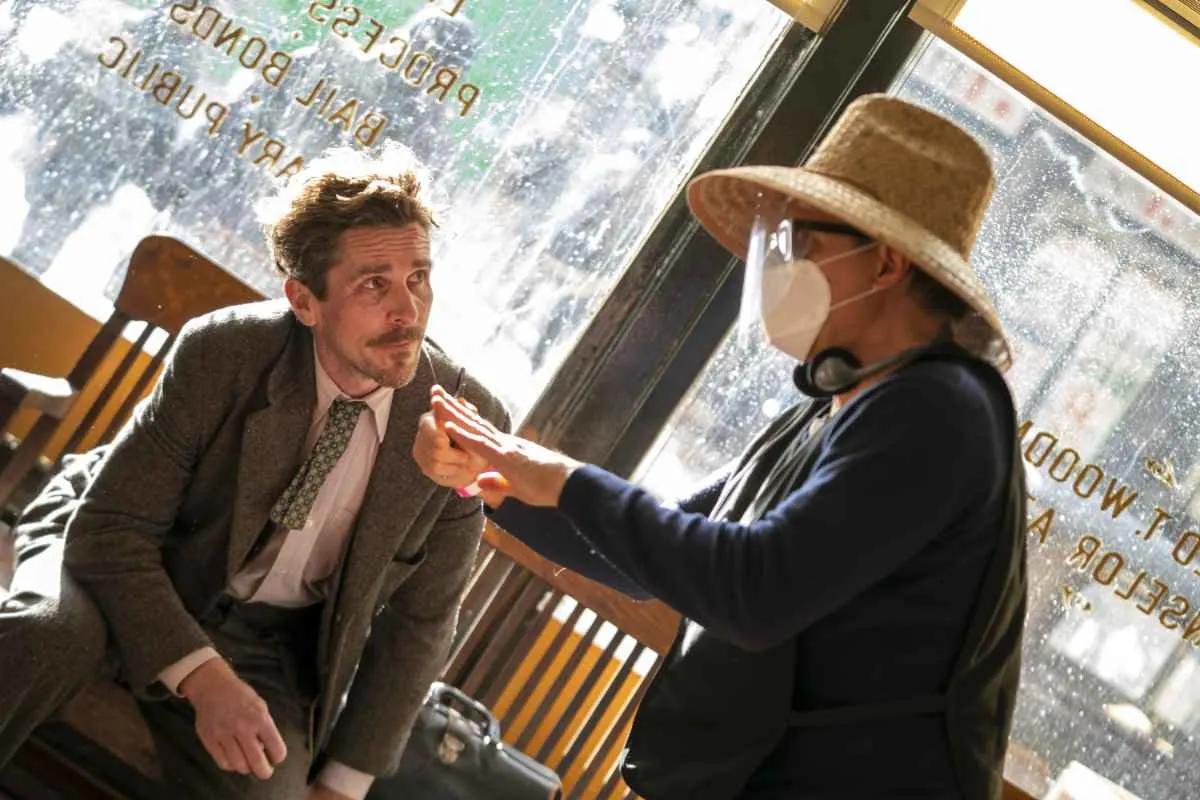
“I was involved with it for five or six years,” confirmed Christian Bale. “But I kind of feel like your entire life, you’ve been working up to doing this. The wisdom of how to deal with adversity. The absolute love of people who deal with pain and suffering in their lives with optimism and hope.
“Not becoming broken by life, etc, and I was just delighted and have so much gratitude to David for inviting me along for this epic journey… You know, from sitting in diners writing on napkins and being gobsmacked by actual events in history that we’d never heard of, listening to music, watching documentaries, reading books, inventing these characters. It was a joy from beginning to end.”
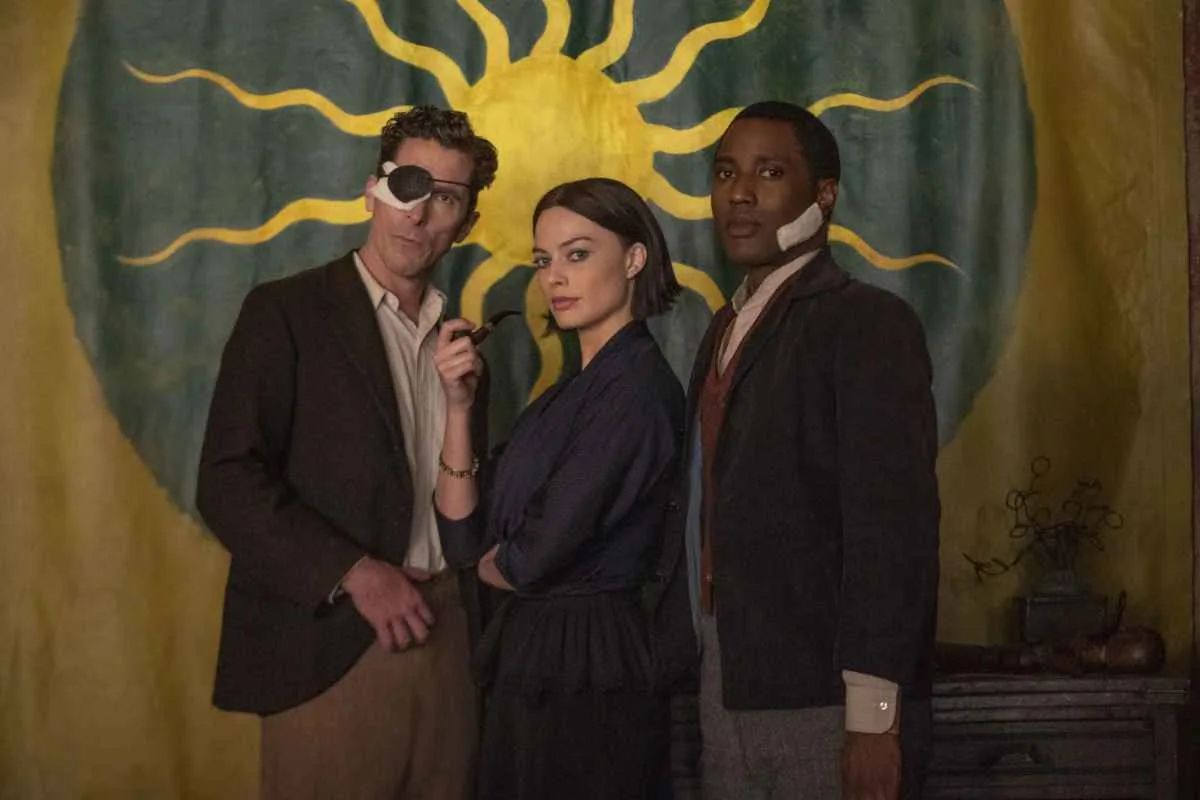
Luckily, Robbie was also brought into that process with Bale and O. Russell, but things may have taken a bit too far. “Fortunately, I had a long time to prep Valerie,” Margot Robbie added. “Longer than I’ve ever had to prep a character. This was not only because David was so collaborative that he wanted to speak about Valerie and this film years before we made it but also because we shut down because of COVID-19.
“So, I really had a long time to prep Valerie. Maybe a little too long, to be honest. I started making a lot of art. Valerie’s kind of art at home in lockdown, and it was getting very weird. She’s cooky, and artistic and… and nuts. I think at one point, my husband walked in, and I had bits of metal and fake blood, and I had my Super 8 out, and I had a mask on, and I had all this crazy stuff like x-rays, and he was like, ‘I think you’re taking this character too far. You need to calm down.’ I was like, ‘Okay.’ Well, I fell in love with her.
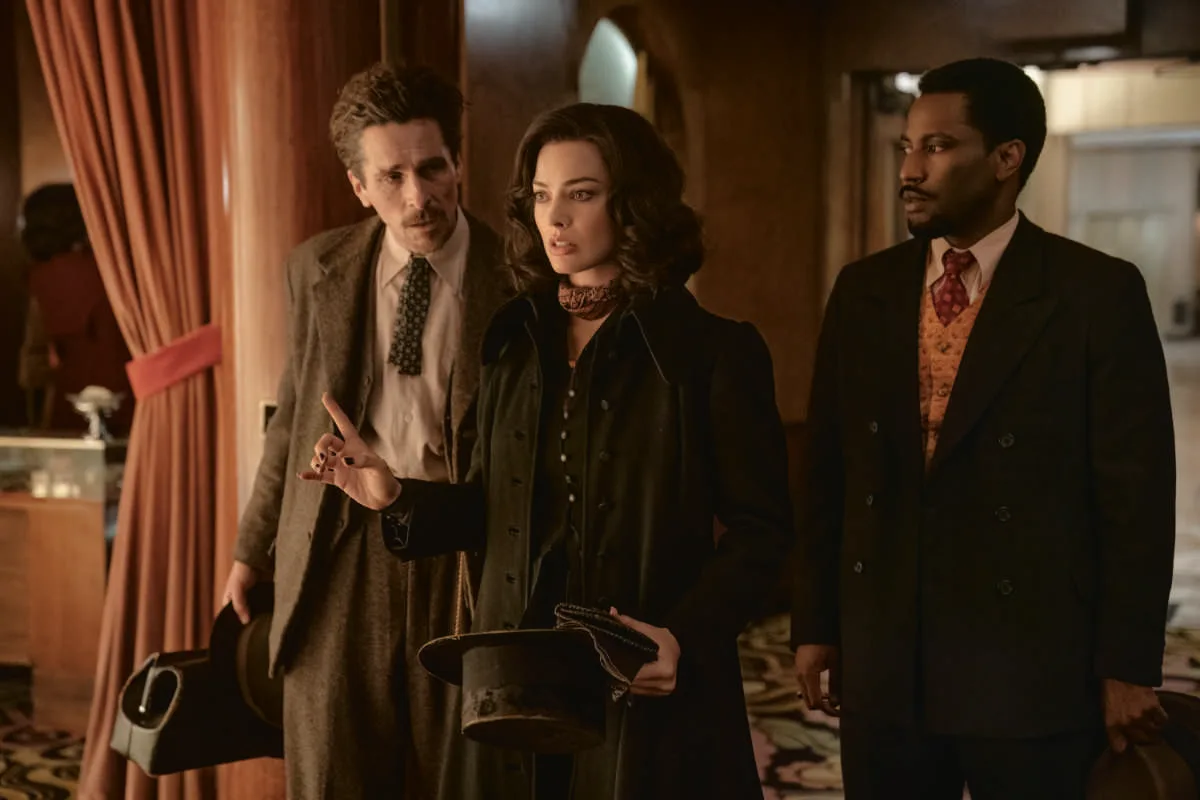
Robbie added: “She just really marches to the beat of her own drum, and her friendship pact that she makes with Harold and Burt is everything to her. David and I spoke a lot. I have a very close trio similar to this. Ironically, we all met in Belgium, as well. For all of us and all of our characters — not to speak for everyone else — but I think you do end up infusing parts of yourself in there, and that comes across in a very authentic way on camera.
“Maybe there are things drawn from history, your own personal history. Maybe it was something really bizarre that David said on the day that everyone just rolled within the moment, and it ends up on screen and makes this magical, strange movie that we have.”

“From the performance perspective, the bedrock of this set was one of humility and optimism,” John David Washington explained. “It was an easy way when we started there with love and respect for one another. There were no egos that I felt on the set, so that made it easier to let your guard down, to be vulnerable, to try anything, and to fall on your face.
“Because you know your cast members will pick you up, and Christian Bale was a great leader in that way. The second day on set, he comes into my little quarters and says, ‘Welcome. All right, you made it through your first day. It’s going to get better from here.’ That’s important. That was great. He didn’t have to do that. He could’ve gone straight to his trailer, but it was at the end of the day, and he decided to tell me that and to say, ‘Now you’re speaking the David language.’ Fall in, get muddy.
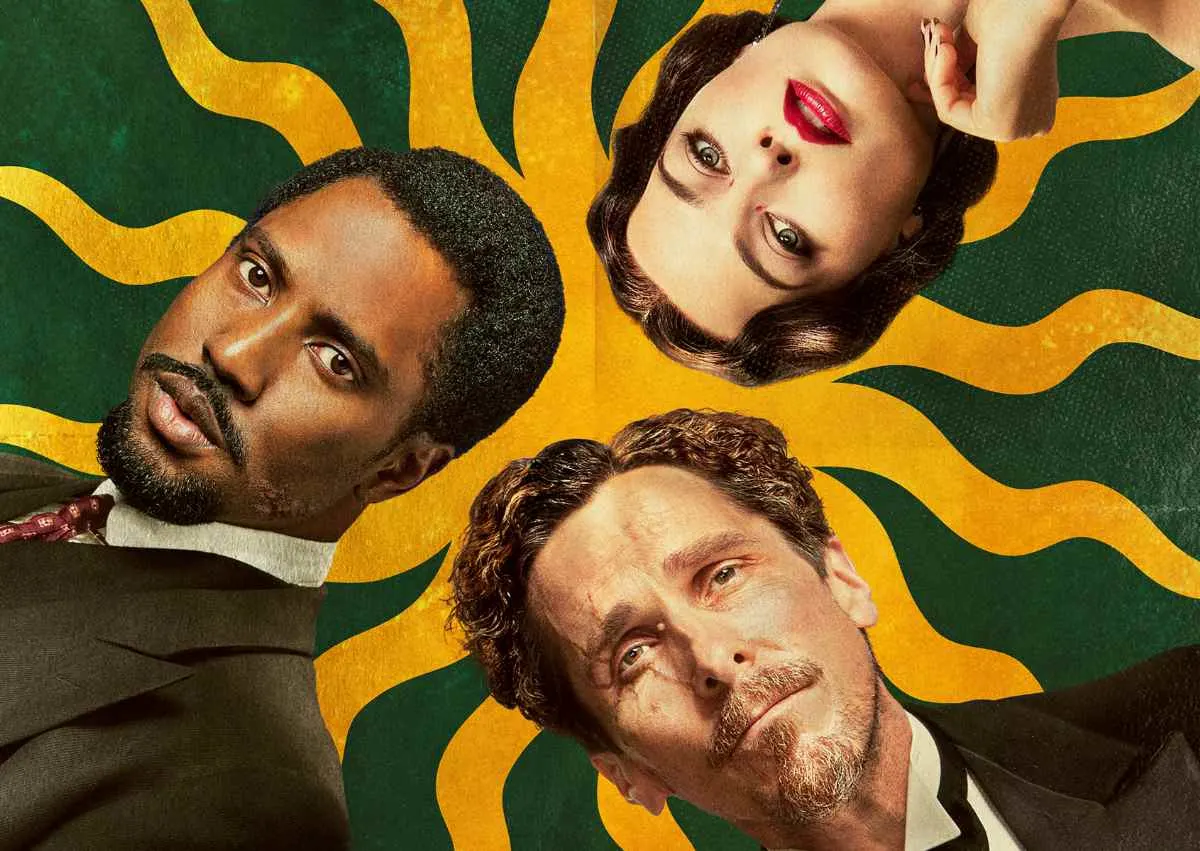
“In knowing that in your spirit, in your subconscious, that’s going to affect your performance. It’s going to inform how you listen to your partners, how you receive what they’re saying, and how you receive notes from David O. Russell. If you’re comfortable with that, if you know that this foundation is based on humility and everybody championing for one another, then that makes it easier and smooth and enjoyable to find the answers to the questions of your characters and their motivations.”
Acting legend Robert De Niro, who previously worked with David O. Russell on Silver Linings Playbook and Joy, gets very engaged with the unique process the director uses. “As Christian is saying, he’s worked more intensely with David, and he carried the films, but I’ve had a terrific time working with David,” the actor said. “We’ll talk about a script or the new thing he’s working on, and he’ll tell me about the character, and this and that, and slowly… In the case of Amsterdam, that’s how we did it.”
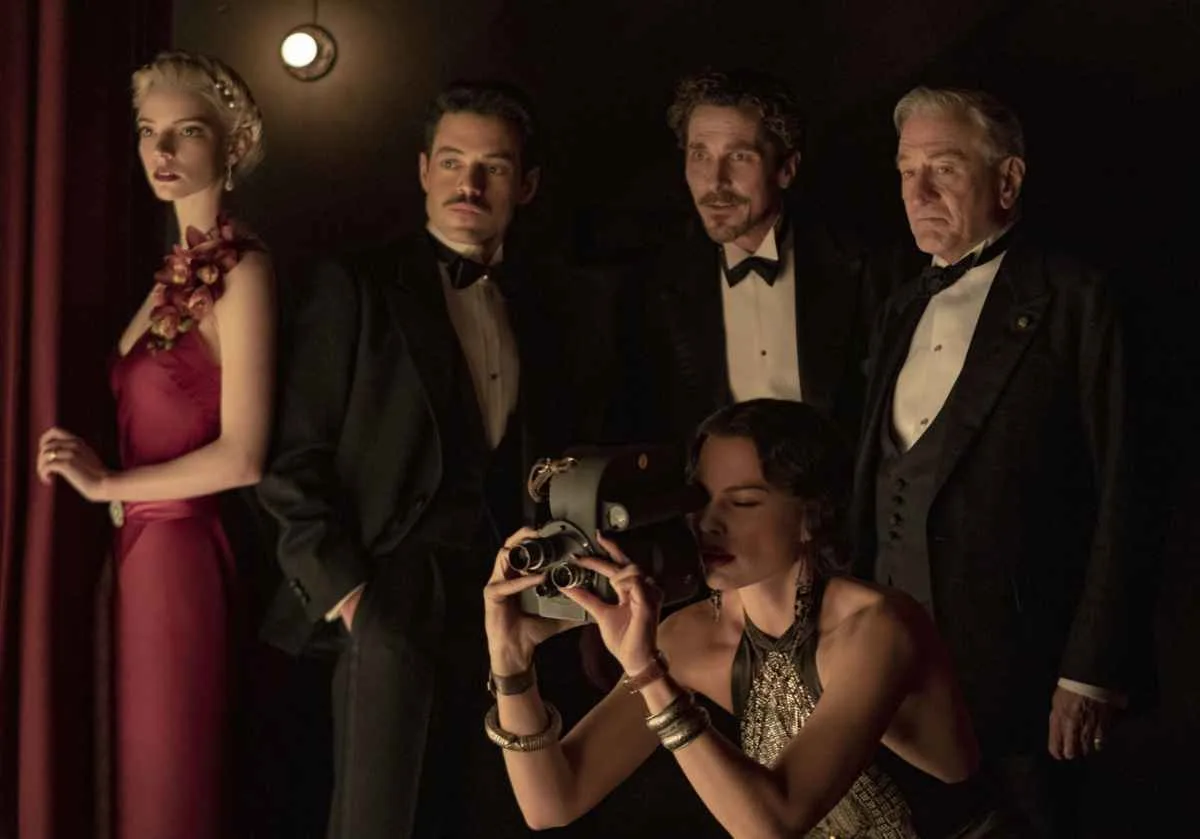
He continued: “We’d talk, and he’d call me, from time to time, we’d get together whenever we could, and it just evolved into what it was. But I always know when he’s doing that, it’s just to me, it’s his process to do it on his feet. It’s like the way he shoots. He’s writing as he’s shooting. He stands behind the camera operator with the Steadicam, or the handheld, and tells him where to go. Sometimes, he tells the actors what to say.
“Sometimes the best dialogue and delivery of dialogue can come out of those moments because they’re so spontaneous, you have no time to think about them. That’s a lot of fun, and that’s how he works. My point is that we talk, we talk, he gets his way, we talk, we talk, and finally, we arrive at where we did with this. This made me then aware of this Smedley Butler character, which I found fascinating because it was at that time, between the First and Second World War, a momentous time in American history, world history, as it is today.”
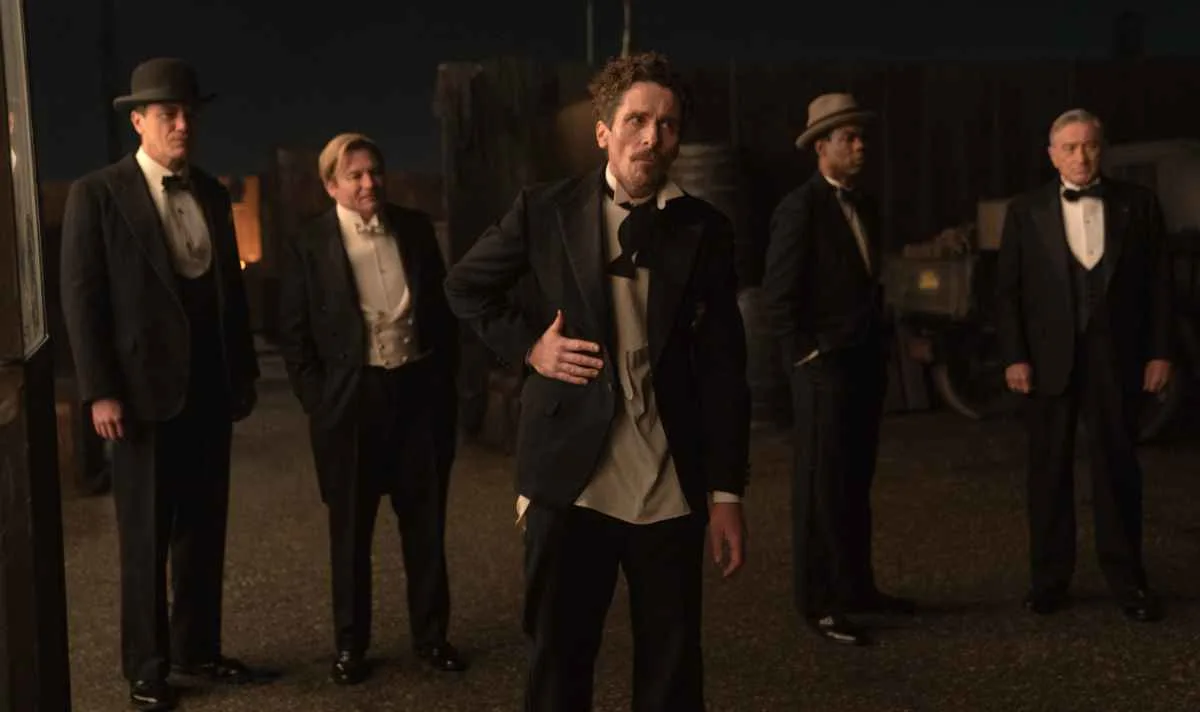
De Niro added, “There was this character, this hero, this military hero, this part of the military elite. Yet, at the same time, a person who is related to the common man, if you will. The lowest-ranking soldier was the one who needed the most help and support. There were a lot of great things that this guy did, and I never heard of him.”
Michael Shannon and Mike Myers are something of a double act in the film, and they enjoyed the process as well. “I’d never really considered bird watching for a personal hobby,” explained Michael Shannon. “But it’s funny. Now that I’ve finished this movie, I pay a lot more attention to birds. It’s true. I was just thinking the other day. I was walking through Times Square, and there were these pigeons flying around in formation. I just kind of forgot where I was for a minute and just stared at them. That’s such a great thing when you do a job, and it turns you on a different wavelength about something you hadn’t really thought about before.

Shannon continued: “I think you’ll hear a similar story. David just gave me a lot of information and a lot of books to look at, and that’s also a great byproduct of working on something like this, just learning stuff that you didn’t know. I don’t think to the extent that Christian and David have, but David and I had had a few lunches and have been batting around ideas for a little bit. It’s great when you work with somebody that you enjoy just sitting and talking to as much as you do actually being on set with them.
“Then I got the pleasure of working with Mr. Myers, who I’ve been a fan of for such a long time. We were talking earlier today about references for this film, and I feel like we’re the Altman contingent. We’re like those quirky characters that come in, and… we just help. You have these three characters on this incredible journey that they’re on, and then they meet us, and we help them get even further along.”

“My mom was in the Royal Air Force during World War II,” Mike Myers revealed. “It was through the Liverpool Blitz; my parents were from Liverpool. My dad was in the Royal Engineers, and my mom used to say, ‘I wish it had never happened, I wouldn’t have missed it for the world.’ That’s what my mum always said about it. She said it’s the clarity of how the Nazis are just bad guys.
“When David called me and said, ‘Would you like to be in this movie?’… I love his work so much. I always feel that what he does is if Cassavetes and a Burt Reynolds film had a baby, you know what I mean? It’s at once high art, and it’s at once ‘come on in the water, which is warm.’ He’s very much an honest entertainer, and I love that, but there’s always an underpinning of heft.”
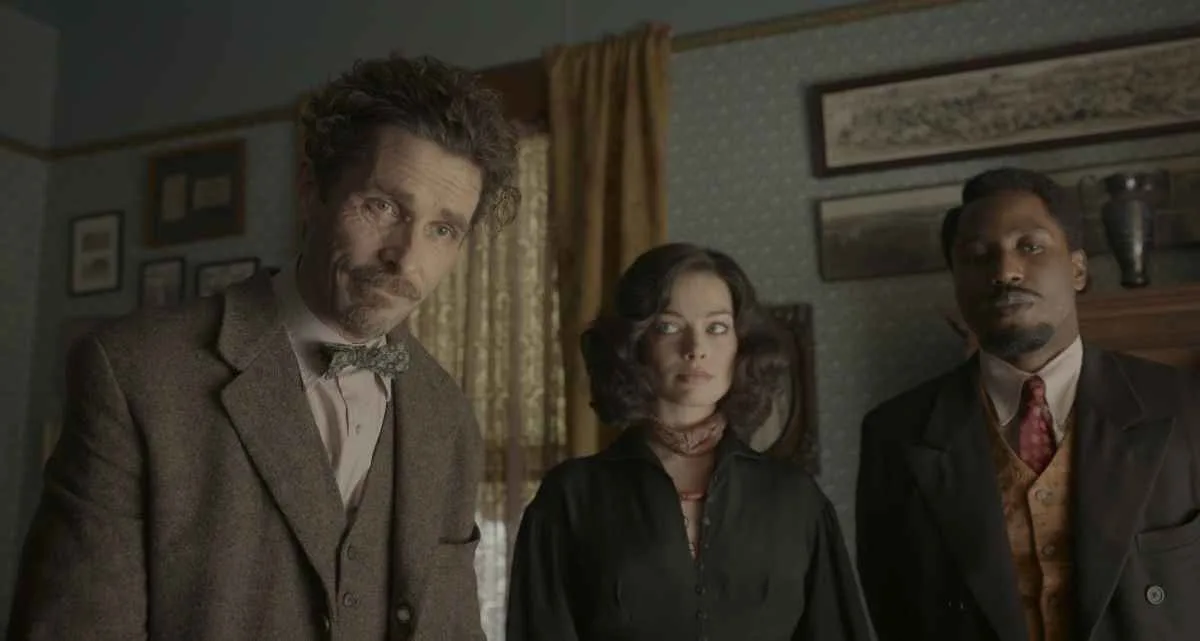
Myers continued: “The fight against fascism is something I grew up with. My parents didn’t say, ‘The Germans attacked.’ They would say, ‘The fascists attacked.’ We’re at a very interesting time right now when working people are ordering from a menu that they don’t know the price or the ingredients of. The Holocaust is at its lowest awareness and the highest skepticism that it exists.
“That is the price that’s on the menu; all authoritarian regimes end in some sort of Holocaust or another. It’s like Flintstones vitamins; in this movie, you’re eating Barney and Dino. You don’t need to know it’s good for you. It’s a great five-ticket ride, but there’s a great message there. I’m so proud to be part of it. Look at this cast. It was like, I imagine what being at The Actors Studio in the 1950s was like, and I got to watch all these great acting styles.”
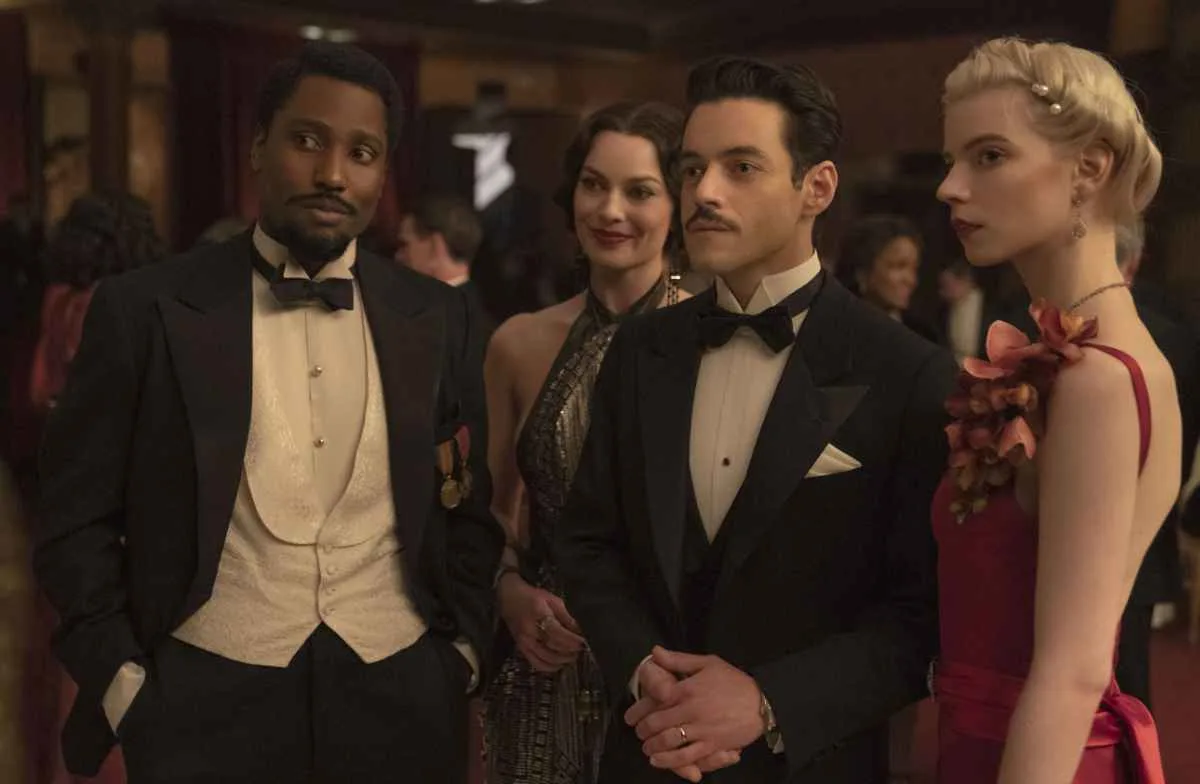
“My character is a little bit of a mixed bag in the sense that her psychology makes about as much sense as a bowl of frogs,” joked Andrea Riseborough. “She is representative of the aspiration to be part of the upper echelons of New York society, and she triumphs and fails at every turn, but she really wants desperately to connect. All she wants to do is connect. She misses the love that she feels. She misses Emily Dickinson. She misses her husband. She misses what she felt was real life internally, but she’s not brave enough to live it with the vivacity that these three friends are.
“She’s on the periphery in a certain sense. To be in that environment in this production with these extraordinary creatives, it felt like playing Beatrice in that environment was like lying on a cloud, you know? You know, so there were moments of true connection with every single person when we each spoke to one another or caught a glimpse of an eye. And it was so vast that we weren’t always necessarily processing it in conversation. But internally it was really meaningful and a changing experience, I think.”
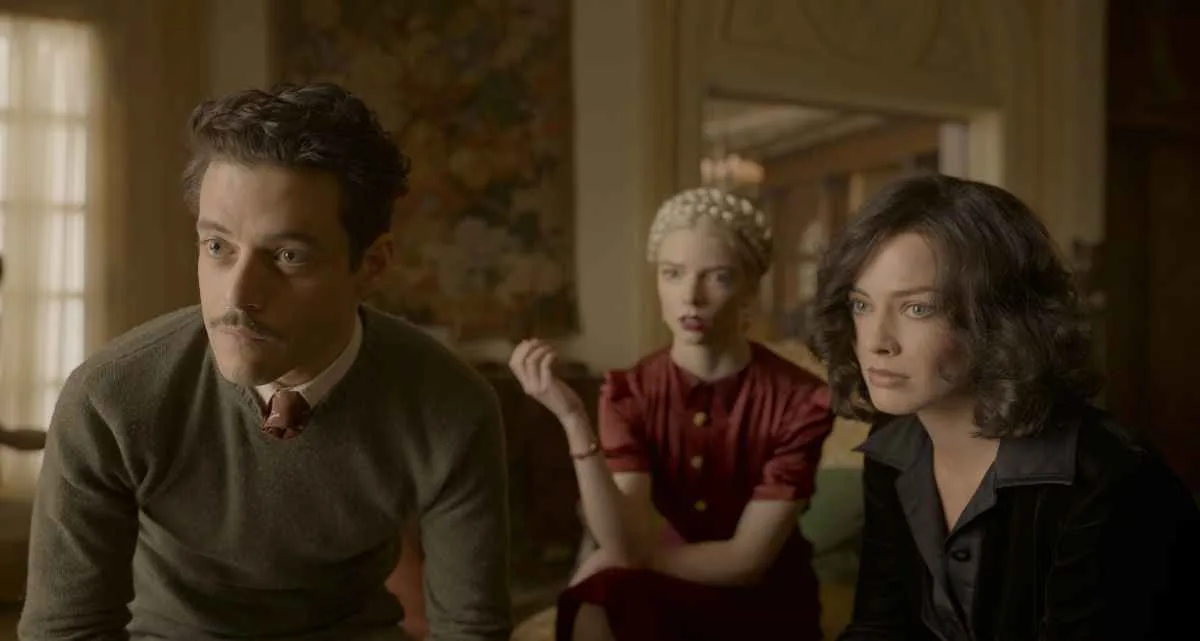
“Look, I hope it’s not a cliché that this is a once-in-a-lifetime experience,” Oscar winner Rami Malek enthused. “You have a film for me that just spoke to me. When you have something as simple as weighing love versus hate and to have that resound throughout your film, when you can deliver that as this great comedic thriller and deliver us this amazing, shocking, untold history but all the while having these themes that just resonate to all of us. I think when we’re done with this film, you ask yourself, what is my Amsterdam?
“What is that moment when I felt emotion but also had this great connection with human beings that led me to a place where I was able to transcend? To be part of a film that will have audiences feeling that as they walk out is something that will be a sacred thing for me long after it premieres. It’s going to stand the test of time.”
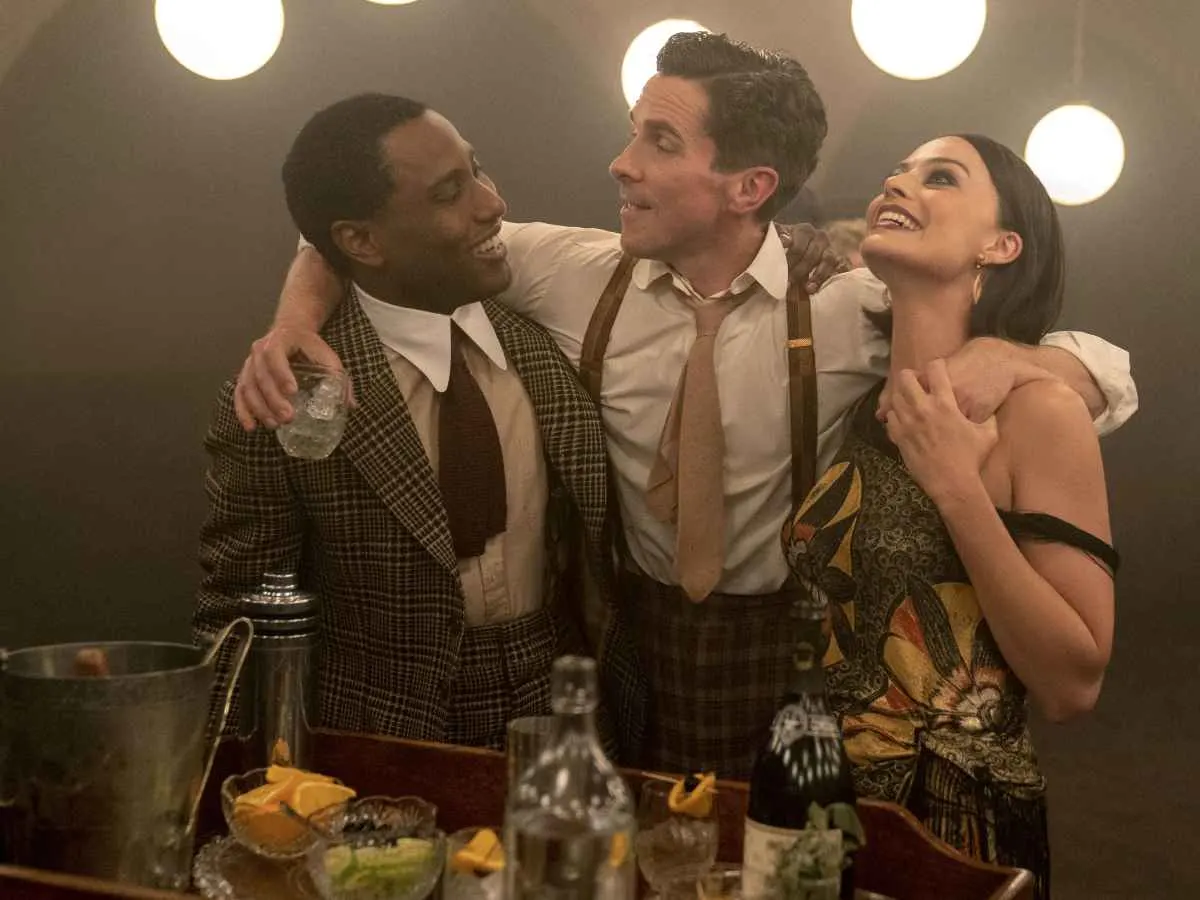
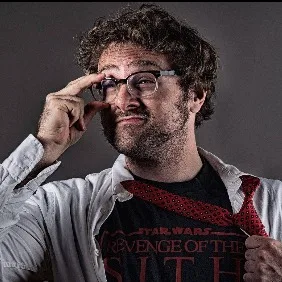
Max Evry has been a film journalist since 2005, serving at various times as a writer, interviewer, graphic designer, podcaster, video creator, features editor, and managing editor. Past media outlets have included MTV, /Film, IGN, and Fangoria. For home video companies Arrow, Kino Lorber, Indicator, and Via Vision, he has provided Blu-ray audio commentaries as well as featurettes for classic and contemporary films, including “Flatliners,” “Blackhat,” and Best Picture Oscar winner “Marty.” In 2023, he released his first book, “A Masterpiece in Disarray: David Lynch’s Dune – An Oral History,” to considerable acclaim.